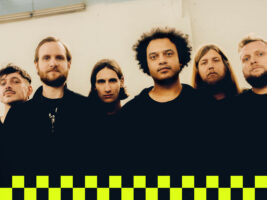
Zeal & Ardor on revolutionising metal, beating the racists and new album Greif
It’s a story that’s been beaten into modern metal folklore. More than 10 years ago, Switzerland-based singer/multi-instrumentalist Manuel Gagneux was searching for ideas for his next project. A racist 4chan user suggested Gagneux, who’s half African-American, should mix “black metal” with “[n-word] music”. Rather than angrily retort, the musician decided a better fuck you would be to rise to the challenge – and actually make the mixture sound good.
“It was basically just, ‘I’m going to do something good in spite of what you just said,’” he reasons today from his apartment in Basel. “And I think we ran with that concept to be honest. It feels like we’ve triumphed over that bullshittery. I had no concept that it would be this good of a fuck you!”
READ MORE: St. Vincent finally overcame her fear of Strats on All Born Screaming
In 2024, Zeal & Ardor are arguably the most successful social media clapback in history. The then-one-man outlet’s self-released debut, 2016’s Devil Is Fine, was a grassroots success, discovered on Bandcamp by enterprising journalists and venerated in major magazines. The way Gagneux accelerated from bluesy verses to snarling, full-throttle metal had never been heard before. By the time 2018 followup Stranger Fruit refined Zeal & Ardor’s approach, often summarised as ‘black metal meets spirituals’, Gagneux had amassed a full live band and was headlining venues across the planet. Tiziano Volante has played lead guitar for the project since 2017.
“For me, coming into the band, it needed to work,” remembers the Italian-born, Basel-based guitarist, who’d previously met Gagneux through the Swiss capital’s metal scene. “This concept brought together so many things I wanted to bring together in music. The essence of combining those things for a better, greater cause [challenging racism] really resonated with me.”
“We had to get acclimated with a lot of things and come to terms with a lot of things,” Gagneux says of the early demand for gigs. Whether discussing racist abuse or whirlwind success, the musician speaks in the same neutral tone of voice, calmly smoking a cigarette indoors.
“I think that’s when the contrast of not being a [professional] musician and being a musician hit the hardest. Suddenly, there are tours and things you only read about, or maybe dreamed wistfully of. Now, when things like that happen, even if there are bigger things happening, because of that contrast already being established, it never smacks as hard as it did back then.”
Image: Press
Break The Formula
‘Black metal meets spirituals’ was both an innovative sound and a catchy summary, key to Zeal & Ardor’s quick ascent. However, like any formula, the interest in it has a pretty short shelf life, be it from the public, the creator or both. The band have pushed more and more powerfully against the descriptor since 2020, never more so than on their brand-new album, Greif. Its title is the German word for ‘gryphon’ and, in much the same way the mythical creature unites the head and wings of an eagle with the body of a lion, its music is a graceful mix of seemingly disparate things.
Upon release, lead single To My Ilk announced Greif’s expanding vision. The track eschews metal entirely, filling its brief run-time with noodling folk guitar, silken croons and atmospheric choirs. In lieu of traditional percussion is a series of smooth claps. Throughout the rest of the record, Zeal & Ardor’s core genres of blues and metal remain, yet each song smoothly integrates new ingredients.
Kilonova, for example, is stacked with guitar tracks, their styles ranging from no-nonsense hardcore chugs to bendy, clean and country-like notes. On Thrill, hardy chords and hoarse scrapes are married into a danceable, pop punk-like riff, whereas Clawing Out goes full prog, synth notes flaring atop metal riffs in an ever-quickening time signature. Une Ville Vide even offers Zeal & Ardor’s first instrumental/electronic song since the interludes of Devil Is Fine – but, rather than feeling like an outlier like the idea did on that debut, amid Greif’s boundless vision it makes perfect sense. Throughout all these eclectic and potentially even distracting genre detours, though, the album stays on the rails thanks to Gagneux’s tight songwriting and earworm hooks.
Present & Correct
Gagneux and Volante describe Greif as the next logical evolution of the Zeal & Ardor sound, expanding upon the cross-genre flirtations of the 2020 EP Wake of a Nation and the band’s self-titled album two years later. The same can be said behind the scenes: this is the first release where the entirety of Zeal & Ardor’s live lineup – Volante, co-vocalists Denis Wagner and Marc Obrist, bassist Lukas Kurmann and drummer Marco Von Allmen – are credited members, having all been present in the studio (Von Allmen has recorded the band’s drums from Stranger Fruit onwards, however).
“Until not too long ago, it was, for instance, ‘Here’s a tour, take it or leave it,’ and that’s not fair to people who’ve dedicated seven years to this project,” Gagneux explains. “Now everyone’s at the table when decisions are made. Everyone has a say as to whether or not we do something.” He laughs: “It feels good not to be a shitty person.”
“It was a very gradual thing,” adds Volante. “Now that we’ve done a couple of album and touring cycles, we trust the process more – and each other, as well. We know our strengths and weaknesses and try to support each other.”
Gagneux says that this “gradual” process of turning live musicians into a full-time lineup informed Zeal & Ardor broadening their sound in the 2020s. “With Wake of a Nation, I wrote a lot for the band,” he reveals. “For instance, there’s a track called Trust No One, which is kind of doomy and sludgy. I knew that Marc, one of our singers, would love it! And there are licks that I wrote that I knew Tizi would be good at, and there are even drums that I programmed with some Marco-esque fills. Even if I didn’t do it consciously, I was catering to people, and through that catering to them, it got more interesting.”
Image: Press
For his Zeal & Ardor recording debut, Volante used a custom guitar by boutique builder Gabriel Aeschbach. It’s the same one he employs live, with a body that looks like a Strandberg crossed with an Ibanez Iceman – perhaps with just a hint of Rickenbacker German carve in there too. With a pair of humbuckers and a hardtail bridge, the whole point is for the guitar to be lightweight and easy to play.
“Very stripped down, just the essentials,” says Volante. “The design of the body is somewhat ergonomic, but it was also an aesthetic touch. Other than that, it’s just a fixed bridge with fixed tuners: nothing too special.”
Gagneux uses a different model but has the same ethic. “I mainly use the Aristides 060, but a rawer version – which is to say they didn’t paint it,” he chuckles. “That thing is just a beast. It never goes out of tune, because it’s not made of wood, and it just sounds great. And it plays like butter.”
The Aristides can also take a beating, which is handy for Zeal & Ardor’s harsh and expressive live shows. “It just can’t break!” Gagneux continues. “And that’s a good thing, because I’m not very kind to my guitars. Onstage, I pretend to be really angry. Sometimes I am, but rarely really am. There are times where I just smack my guitar, where it sounds like I’m making a huge sound but it’s really just a… knock. That’s a move I stole from Tizi, by the way.”
Despite Greif marking the first time that the now-complete Zeal & Ardor lineup recorded together, Gagneux and Volante say the process in the studio was as smooth as can be. The scratch tracks were still all Gagneux’s brainchildren, but the mastermind claims that his bandmates made the album something he never could have realised by himself.
“Historically, we would never talk about things that we think could make for a weird atmosphere,” he says. “But now I think we’re better at expressing ourselves. In the studio specifically, Tizi came in with tracks he had done for the record, and they sounded fantastic! It was like, ‘This is rad! This is something I never could have done alone.’ I was enthused.” Ultimately, the album that came from the process reaffirms Zeal & Ardor’s place as an original force in extreme metal. From ‘black metal meets spirituals’ to a now-indescribable genre, the band have transcended genre while retaining their tight, sharp songwriting. And, Gagneux concludes, that means the goal for this project has already been reached.
“I don’t think we ever had specific wishes [for our career],” he says. “It was more the artistic thing, and perhaps the perception of the band. We don’t want people to see us as a genre tag, but as a creative force.”
Zeal & Ardor’s Greif is out now
The post Zeal & Ardor on revolutionising metal, beating the racists and new album Greif appeared first on Guitar.com | All Things Guitar.
Source: www.guitar-bass.net













